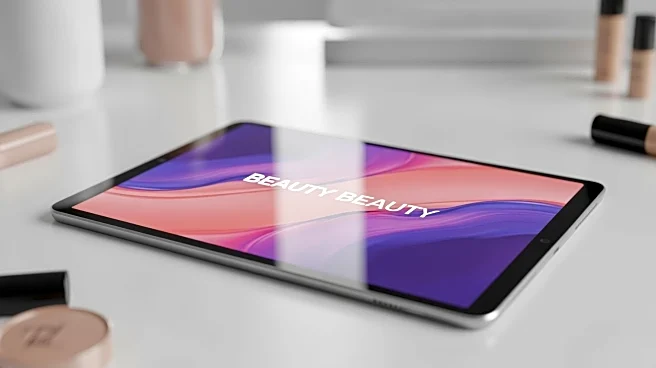What's Happening?
At the Shoptalk Fall 2025 event in Chicago, industry leaders discussed the evolving landscape of consumer commerce in the beauty sector. Key insights were shared by Jacqueline Flam, managing director of beauty and health at NielsenIQ, and Jeremy Lowenstein,
chief marketing officer at Milani Cosmetics. The discussions highlighted the significant shift towards digital platforms for beauty product discovery and purchase, with online sales in North America growing over 20% and outpacing in-store sales by nine times. Platforms like TikTok Shop and Amazon are driving this growth, while AI tools such as ChatGPT are reshaping consumer decision-making processes. The event underscored the importance of digital-first strategies, particularly in social and mobile commerce, to maintain brand visibility and relevance.
Why It's Important?
The shift towards digital-first strategies in the beauty industry reflects broader changes in consumer behavior, where transparency, sustainability, and brand authenticity are increasingly valued. This evolution presents both challenges and opportunities for beauty brands. Companies that successfully adapt to these changes can enhance consumer trust and engagement, leading to long-term brand equity. The emphasis on digital platforms also highlights the need for brands to innovate in their marketing and product development strategies, aligning them with consumer expectations for both performance and purpose. This shift could lead to significant growth opportunities, particularly in wellness-centric innovations that integrate beauty with self-care practices.
What's Next?
As the holiday season approaches, beauty brands are expected to focus on inventory planning and ensuring their e-commerce platforms are well-stocked. The continued pressure from inflation and supply chain disruptions will require brands to diversify sourcing and build operational resilience. Additionally, the integration of wellness into beauty products is anticipated to be a high-growth area, with brands exploring innovations that align with consumer interest in holistic lifestyle products. The industry will likely see further developments in measurement tools that go beyond sales metrics to include consumer engagement and sentiment, which are crucial for maintaining brand trust and growth.
Beyond the Headlines
The increasing demand for transparency and authenticity in the beauty industry may lead to a reevaluation of traditional marketing strategies. As consumers prioritize brand values alongside product efficacy, companies may need to redefine success metrics to include qualitative measures of consumer engagement and sentiment. This shift could drive a more holistic approach to brand management, where performance and purpose are integrated from the outset of product development and marketing initiatives. The focus on digital platforms and AI tools also suggests a future where technology plays a central role in shaping consumer experiences and brand interactions.
















